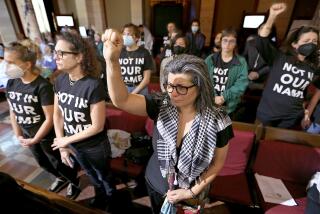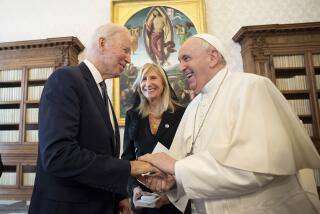Church Group Calls for Halt to Gulf Buildup
- Share via
The National Council of Churches’ governing body Thursday called for the United States to substantially reduce its armed forces in the Persian Gulf and immediately halt its military buildup, becoming the latest religious group to raise moral objections to a possible war.
Although declaring Iraq’s invasion of Kuwait and its holding of hostages “appalling,” the nation’s largest ecumenical body said that a U.S. offensive to oust Iraq from Kuwait would lead to great loss of life, bring devastation to the region and have “a corrosive effect” on American society.
The council’s 200 delegates, from 32 Protestant and Eastern Orthodox member denominations, unanimously approved the resolution at their annual general board meeting in Portland, Ore.
In urging a large but unspecified cutback from the approximately 240,000 troops now in the gulf, the council went further than most mainline Christian bodies that are urging that a diplomatic solution be found.
Dwain Epps, the council’s director for global issues, said in an interview after the vote that the resolution assumes that “if any U.S. troops remain in the gulf region, they should be placed under U.N. command. What is called for is an immediate halt to the buildup. The mere magnitude of the U.S. presence there poses a risk of confrontation by design or accident.”
Observers say recent church objections to the possible use of military force by the United States have started to approach the broad anti-war sentiment expressed by religious leaders late in the Vietnam War.
Council officials hope to coordinate their opposition to war with U.S. Roman Catholic bishops and other religious groups.
In Washington, the president of the National Conference of Catholic Bishops on Thursday sent an open letter to President Bush warning that U.S. offensive military action against Iraq now “could well violate” the criteria of a “just war.”
The message was written by Archbishop Daniel E. Pilarczyk of Cincinnati, who said it reflects the majority view of the approximately 270 bishops attending the conference’s annual meeting in Washington. The message reiterated moral concerns in a letter sent to Secretary of State James A. Baker III last week.
War can be just if it is “genuinely a last resort” after “all reasonable peaceful alternatives (have been) fully pursued,” the letter said. “. . . The human, economic and other costs of war” should be “proportionate to the objective to be achieved by the use of weapons of war.”
Those conditions have not yet been met, the letter said, adding, “I fear that, in this situation, moving beyond the deployment of military forces in an effort to deter Iraqi aggression to the undertaking of offensive military action could well violate these criteria. . . .”
The National Council of Churches’ resolution urged Iraq to immediately release all hostages and to withdraw military forces from Kuwait.
In contrast to U.S. policy statements against including the resolution of Israeli-Palestinian conflicts in any negotiations with Iraq, the council called for an international conference to develop a “comprehensive” Middle East peace. The statement envisioned a conference that would seek to implement U.N. resolutions calling for the withdrawal of Israeli troops from territories it occupied in the 1967 Middle East War.
“The present crisis cannot be isolated from the unresolved issues of the region as a whole,” the statement said.
The council also urged its member churches and individual Christians to make peace in the Middle East an “urgent priority for prayer, study and action.”
The initial response to the Persian Gulf crisis by council executives Sept. 14 condemned the invasion by Iraq and urged the U.S. to seek a negotiated settlement.
But “reckless rhetoric” by the Bush Administration about initiating war has changed matters, according to the new statement. “We feel we have a moral responsibility publicly and unequivocally to oppose a policy that could have such dire consequences,” it said.
The statement by the council, which ends its three-day meeting today, reflected many stances that its member denominations have begun taking.
For example, Presiding Bishop Edmond L. Browning of the Episcopal Church said Oct. 5 that the economic sanctions against Iraq “must be given time to work” and that U.S. cooperation with the United Nations and the Arab states “offer the best hope for a bloodless solution.”
More than 2,500 United Methodist clergy and lay people signed a statement earlier this month at a national conference in Dallas calling on Bush to use political and economic pressure rather than military action. The statement, authored by Methodist bishops, was to be delivered to the White House.
Archbishop Pilarczyk’s letter to Bush, the second Catholic communication to the Administration on the crisis, followed one a week ago by Archbishop Roger M. Mahony of Los Angeles, who sent a letter to Baker raising moral objections to the possible use of military force.
The further step was considered necessary after Bush ordered a substantial buildup of U.S. forces so that they could carry out offensive action if necessary.
Pilarczyk’s letter expressed “strong condemnation of Iraq’s aggression, hostage taking and other violations of human rights” and urges Bush to stay the course of international sanctions and diplomatic pressure.
It also accepted that maintaining a large military force in the gulf is needed to make Iraq pursue a peaceful solution seriously. “Our concern is that the pressures to use military force could grow as the pursuit of nonviolent options almost inevitably becomes difficult, complex and slow,” Pilarczyk wrote.
The White House had no immediate comment.
Dart reported from Los Angeles and Johnston from Washington.
More to Read
Sign up for Essential California
The most important California stories and recommendations in your inbox every morning.
You may occasionally receive promotional content from the Los Angeles Times.













